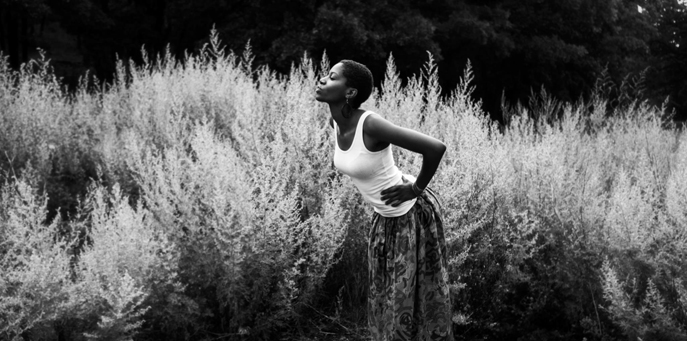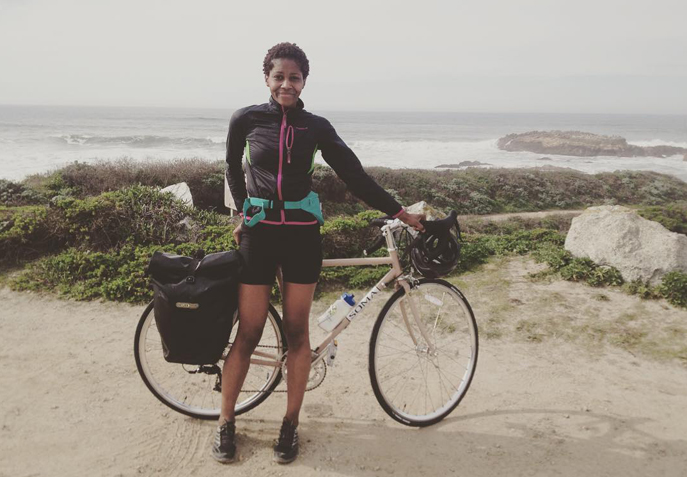Grace Anderson, the Sierra Club's new Inspiring Connections Outdoors (ICO) representative, was just named one of America's "30 Under 30" outdoor movers-and-shakers by the Outdoor Industry Association. The Planet sat down with Anderson to talk about her vision for ICO (formerly Inner City Outings), why people of color are underrepresented (or at least perceived to be) in the great outdoors and the "outdoor industry," and how it feels to be named one of that industry's "brightest young minds."
Planet: Let's start from the beginning. Where did you grow up?
Anderson: In Staunton, Virginia, in the Shenandoah Valley. I moved there when I was very young, so I consider that to be home.
Planet: Did growing up there inform your affinity for the outdoors? Were you an outdoorsy kid?
Anderson: Not particularly. Staunton is just west of the Blue Ridge Mountains and Shenandoah National Park -- the park is barely a dozen miles away as the crow flies -- but growing up I honestly didn't realize I lived so close to so much amazing nature. I didn't start to really make that connection until I was in college.
Planet: You attended Winston-Salem State University, a Historically Black University (HBCU) in North Carolina. What was it that spurred your love of the outdoors while you were in college?
Anderson: One of my favorite professors remarked one day that I had a lot of energy and maybe I should take it outside. He referred me to the Student Conservation Association (SCA) , which connects high school and college-age students to the outdoors through internships. Through that experience I got selected to participate in a spring break trip in Joshua Tree National Park in California. Until then I didn't realize you could actually get paid to work in the outdoors. I've stayed on that path ever since.
After I graduated from college, I moved to North Dakota to teach at Lake Metigoshe State Park, right up against the Canadian border. I taught environmental education to local families and students from schools in the area who came out to the park. I loved the work and it was also an eye-opener in that I noticed the lack of diversity in staffing in the park systems.
Planet: That actually segues right into my next question. As I'm sure you know, a disproportionately low number of African Americans and other people of color visit our national parks, state parks, and wilderness areas, and faces of color are generally underrepresented among outdoor recreationists. Why do you think this is?
Anderson: Well, it's true that when we open up a magazine or any type of print about outdoor recreation, there are relatively few racial minorities pictured. I don't think there's enough of an effort being made to show or represent people of color connecting to the outdoors. And by "getting outdoors," I'm not just talking about hiking and camping; it can be picnicking, fishing, or just going to a city park or a local recreation area; what I call "nearby nature." Those images aren't being captured or promoted. But this is something that can change -- and I believe will change along with the changes in America's "complexion." It will take well-established organizations like the Sierra Club to set the standard by role modeling and driving representation of all communities.
While working at the National Outdoor Leadership School (NOLS) in the Wind River Mountains in Wyoming, I was a part of the team that organized the first summit ascent of Denali by African Americans: Expedition Denali. Part of the project that I coordinated was 10,000 Steps to Denali, which encouraged people and communities of color to host their own “expedition” outside on the date of the summit bid. And after the team came down off the mountain, I coordinated their speaking events and traveled around the country with them.
When I first moved to San Francisco, I worked with an organization called Girl Ventures, whose mission is to empower adolescent girls -- two-thirds of whom are from low- and moderate-income backgrounds -- by giving them field instruction in backpacking, climbing, and sea kayaking. Then after that I worked for a school called Eagle Rock School -- a "purposefully diverse" school, largely for kids who didn't expect to graduate from high school -- in Estes Park, Colorado, leading an expedition into the wilderness that lasted 24 days. I spent last year traveling to Patagonia, the Yukon Territory, and other wild spaces. And after that I returned here to work with the Sierra Club's ICO program.
Planet: What do you hope to accomplish as ICO representative? What's your vision for the program?
Anderson: First of all to reinforce and strengthen ICO's mission to connect people who have limited access to the outdoors to experiences in nature, whether that be in a county park or a national park. We have amazing volunteers around the country putting a lot of time into connecting youth to the outdoors and I want to support that as much as possible. I also want to really focus hard on addressing some of the potential barriers that prevent this connection from happening. ICO is thriving and I want it to thrive even more! One of my goals is engaging ICO leaders of color who represent the populations we're working with. And I also want to get everyone who's involved with ICO -- volunteers and staff alike -- "on the same page" incorporating our diversity, equity, and inclusion (DEI) initiative into their work.
Planet: What do you think it will take to make the broader environmental movement "look more like America"? What do organizations like the Sierra Club have to do, and how do we have to change and evolve to bring this about?
Anderson: Well, for one thing we have to get out and meet people "where they are." One of the most meaningful things a representative of any environmental or advocacy group can do is go to the communities and meet people on their own ground, whether that be in a church, a park, a community center, or whatever. We've got to put actions behind our words, and that means not just showing up, but doing things that engage people and participate in activities that are meaningful to them and speak to their values and aspirations. We need to reach out and create personal relationships with community organizations and then come through by providing resources they may not have, but which can help them achieve their objectives.
Planet: How does it feel to be recognized as one of the American Outdoors Association's "30 Under 30" brightest young minds in the outdoor realm?
Anderson: I'm incredibly humbled. There are so many people doing amazing work in the environmental and outdoor fields. I hope to use this award as a platform to engage more and bigger partners in conversations around connecting people who have limited access to the outdoors with nature, and telling the many stories of how people in engage in the outdoors.

Learn more about the Sierra Club's Inspiring Connections Outdoors program.
